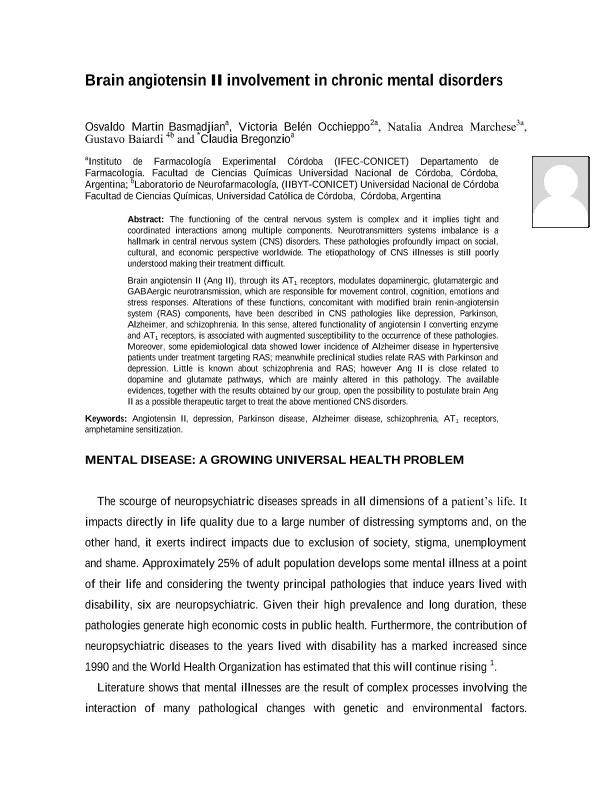Artículo
Brain angiotensin II involvement in chronic mental disorders
Basmadjian, Osvaldo Martin ; Occhieppo, Victoria Belen
; Occhieppo, Victoria Belen ; Marchese, Natalia Andrea
; Marchese, Natalia Andrea ; Baiardi, Gustavo Carlos
; Baiardi, Gustavo Carlos ; Bregonzio Diaz, Claudia
; Bregonzio Diaz, Claudia
 ; Occhieppo, Victoria Belen
; Occhieppo, Victoria Belen ; Marchese, Natalia Andrea
; Marchese, Natalia Andrea ; Baiardi, Gustavo Carlos
; Baiardi, Gustavo Carlos ; Bregonzio Diaz, Claudia
; Bregonzio Diaz, Claudia
Fecha de publicación:
07/2017
Editorial:
Bentham Science Publishers
Revista:
Protein and Peptide Letters
ISSN:
0929-8665
e-ISSN:
1875-5305
Idioma:
Inglés
Tipo de recurso:
Artículo publicado
Clasificación temática:
Resumen
Background: The functioning of the central nervous system is complex and it implies tight and coordinated interactions among multiple components. Neurotransmitters systems imbalance is a hallmark in the central nervous system (CNS) disorders. These pathologies profoundly impact the social, cultural, and economic perspective worldwide. The etiopathology of CNS illnesses is still poorly understood, making their treatment difficult. Brain angiotensin II (Ang II), through its AT1 receptors, modulates dopaminergic, glutamatergic and GABAergic neurotransmission, which are responsible for movement control, cognition, emotions and stress responses. Alterations of these functions, concomitant with modified brain reninangiotensin system (RAS) components, have been described in CNS pathologies like depression, Parkinson, Alzheimer, and schizophrenia. In this sense, altered functionality of angiotensin I converting enzyme and AT1 receptors, is associated with augmented susceptibility to the occurrence of these pathologies. Moreover, some epidemiological data showed lower incidence of Alzheimer disease in hypertensive patients under treatment targeting RAS; meanwhile preclinical studies relate RAS with Parkinson and depression. Little is known about schizophrenia and RAS; however, Ang II is closely related to dopamine and glutamate pathways, which are mainly altered in this pathology. Conclusion: The available evidences, together with the results obtained by our group, open the possibility to postulate brain Ang II as a possible therapeutic target to treat the above-mentioned CNS disorders.
Archivos asociados
Licencia
Identificadores
Colecciones
Articulos(IIBYT)
Articulos de INSTITUTO DE INVESTIGACIONES BIOLOGICAS Y TECNOLOGICAS
Articulos de INSTITUTO DE INVESTIGACIONES BIOLOGICAS Y TECNOLOGICAS
Citación
Basmadjian, Osvaldo Martin; Occhieppo, Victoria Belen; Marchese, Natalia Andrea; Baiardi, Gustavo Carlos; Bregonzio Diaz, Claudia; Brain angiotensin II involvement in chronic mental disorders; Bentham Science Publishers; Protein and Peptide Letters; 24; 9; 7-2017; 817-826
Compartir
Altmétricas



